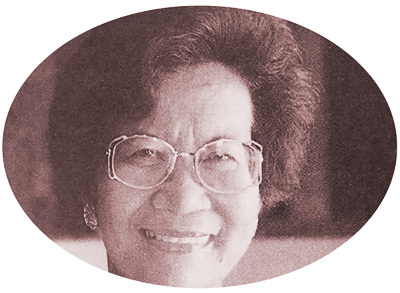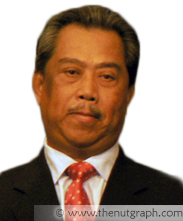 DURING the first weekend of November 2011, the PPSMI (the Teaching and Learning of Science and Mathematics in English) policy trended on Twitter. This evidence of PPSMI’s importance to large numbers of tech-savvy Malaysians came shortly after Deputy Prime Minister Tan Sri Muhyiddin Yassin’s back-to-back statements on the policy.
DURING the first weekend of November 2011, the PPSMI (the Teaching and Learning of Science and Mathematics in English) policy trended on Twitter. This evidence of PPSMI’s importance to large numbers of tech-savvy Malaysians came shortly after Deputy Prime Minister Tan Sri Muhyiddin Yassin’s back-to-back statements on the policy.
Muhyiddin first reiterated that PPSMI would be phased out according to the schedule proposed two years ago. The next day he backpedalled to announce a Cabinet decision that current Year 1 students may have the option of continuing under PPSMI until they complete Form 5.
The volume of discussion about PPSMI is a heartening sign of our growth towards becoming a democratic populace. Nevertheless, much of the conversation surrounding this controversial education policy remains mired in partisan and unsubstantiated debate. If we are to be a genuinely democratic and savvy nation, the polemics around PPSMI must not prevent us from looking at it in simultaneously inclusive and critical ways. Perhaps we can start by unpacking some of the debate’s crucial themes.
![]() PPSMI is not the only possible cure for Malaysia’s educational deficiencies.
PPSMI is not the only possible cure for Malaysia’s educational deficiencies.
Arguably, the design of PPSMI was somewhat ad hoc. It was born out of then Prime Minister Tun Dr Mahathir Mohamad’s longstanding emphases on English and technology, and shaped by the urgency of implementing the policy before his retirement. PPSMI was rolled out barely half a year after it was first proposed in 2002, straining curriculum planners, textbook publishers and teachers nationwide, many of whom did a commendable albeit flawed job under the circumstances.
Apart from the flawed implementation, questions remain about PPSMI’s premise: that teaching pupils science and mathematics in an academically dominant language is the most effective way of equipping them for technological research and linguistic versatility. Countries ranging from Vanuatu to South Africa similarly struggle with and, in some cases, construct nuanced solutions for language-medium policy in contexts that are ethnically diverse, post-colonial and globalised.
Thus, in the Malaysian context, the debate need not be locked into a PPSMI-or-not binary, but rather could find a consensus within the broader spectrum of possible policies.
![]() PPSMI should not be an electoral issue.
PPSMI should not be an electoral issue.
In her 2008 PhD thesis on PPSMI, former Director-General of Education Datuk Dr Asiah Abu Samah wondered if “the policymakers in the Ministry and the public at large have the patience to wait 10-12 years to see clear results”. Unfortunately, Asiah’s caution was prescient: PPSMI’s gradual termination was announced in July 2009, a few days before the Manek Urai by-election. Recent publicly expressed comments about PPSMI have also entered the precarious territory of electoral ultimatums.
Deciding how to vote based on a single education policy is problematic because education interacts with many other policy processes. For example, even if a graduate has impeccable training in innovation and English, his or her career trajectory can be strongly impacted by government decisions about the structure of the economy.

While it is unsettling to see PPSMI become the subject of single-issue voting, it is far more disconcerting to watch our leaders make education policy a pawn in political bargaining. There is a fine line between a government that fears its people and a government that arbitrarily concedes to voters because it fears losing power.
The consequence is that education policy becomes vulnerable to election schedules. This is especially risky because education policy is a long-term investment; the outcomes of a policy can only be assessed once a cohort of students has completed an educational cycle.
Similarly, the pool of qualified and available teachers must come from within the system and has to be built up gradually over time, generation after generation. We cannot improve English-language teaching solely by hiring “native” speakers, not least because education matters as much to nation building as to economic development.
![]() We should not generalise about PPSMI without understanding the concerns of different groups.
We should not generalise about PPSMI without understanding the concerns of different groups.
Prevailing opinions in newspapers and blogs about the decade-long PPSMI debate are skewed towards their respective language mediums. A casual reader of English-language newspapers in 2002 would have had the impression that almost everyone supported PPSMI. A casual reader of Malay-language newspapers in 2009 would have had the impression that almost everyone supported its termination.
These media biases have compounded the problem of developing mutual understanding across various PPSMI interest groups. Those within each group hear their own opinions echoed by their fellows, often without listening to the other side. It is true that English proficiency is vital to international competitiveness, but it is equally true that Malay is vital to our national identity.
Chinese- and Tamil-language educationists have had their own concerns. For both, PPSMI represented a threat to culture and to a key area of school performance, whether Mandarin-medium schools’ traditional eminence in science and mathematics education, or Tamil-medium schools’ efforts to minimise the dropout rate. Other issues were regional: while the PPSMI spotlight often turned to rural areas, high-need schools in depressed urban areas were neglected.
![]() We must not make education policy without rigorous foundations.
We must not make education policy without rigorous foundations.
Because it is such a crucial national investment, education policy must be grounded in rigorous research. The irony is that the government is promoting a research-driven education system without the system itself being subjected to sound analysis.

The government has yet to give convincing answers to the repeated calls for data-driven education policy decisions. In June 2009, one month before announcing the retraction of PPSMI, Muhyiddin publicly expressed surprise that English was not a compulsory-pass subject for the Sijil Pelajaran Malaysia. In August 2011, he said he was “incapable of answering” why the national education system “is still unable to provide our students with a good grasp of the English language“.
To be fair, rigorous analysis of the impact of PPSMI is tricky because no cohort of students has been fully educated under PPSMI; it began to be phased out before it was fully phased in.
That said, available data sources are sorely underutilised. True, the fluctuations in Malaysia’s performance in the Trends in International Mathematics and Science Study (TIMSS) appeared regularly in PPSMI discussions. Yet, hardly any PPSMI-specific statistical analysis has been performed on this dense and freely available data set.
Similarly, there has been little evidence that pertinent and rigorous studies have been consulted in the policy shifts surrounding PPSMI. Neither the wide international literature on language and education policy nor Asiah’s thorough dissertation was cited in any official releases. Instead, the most politically prominent studies related to PPSMI were a 2008 study conducted by faculty members at Universiti Pendidikan Sultan Idris (Upsi), and a 2009 study by a group known as Pemuafakatan Badan Ilmiah Nasional (Pembina) and academics from eight public universities.
Questions have been raised about the sampling methodology and conclusions of the Upsi study, but it continues to be cited as evidence against PPSMI. While neither the identity of Pembina nor the contents of its study are publicly known, results from this study were among the statistics cited by Muhyiddin in the PPSMI reversal announcement.
Lastly, it would be hypocritical of me to make these arguments without giving my own statement of full disclosure. I grew up in several small Malaysian towns, attending national schools pre-PPSMI and reading second-hand English books at home. While at university in the US, I wrote my undergraduate political economy thesis on PPSMI. I don’t have all the answers, but I do believe that we can find them in patient and informed conversation. ![]()
Hwa Yue-Yi is working towards a master’s in political science in the UK. Once she finishes her formal education, she hopes to replicate for other young Malaysians the academic mobility she has enjoyed. For now, she really hopes that her application for a postal ballot yields results in the next general election.


JW Tan says
I believe that dumbing down is a major problem in Malaysia. There is a lack of academic streaming and a lack of challenging curricula, meaning that all students are taught to the same poor common denominator. And this has been going on for a long time.
When in primary school in the mid- to late-80s, I was taught addition from Standard 1-6. Why? Is the quality of teaching so bad that children can’t be relied upon to grasp simple addition after three to four years of teaching? Similarly I did not study Sains, or Sejarah, or Geografi. I studied Alam dan Manusia, which had no equations, no experiments, no practical applications, just a book with lots of stories and dates. The curriculum did not improve in secondary school, and has, incredibly, been dumbed down even further since then. In the job market these days, it’s not unknown to see SPM holders who can’t add or multiply.
In such a situation, any initiative to raise teaching and marking standards for school curricula must be applauded. That’s why PPSMI was so popular. Getting rid of it simply means that the vast majority of Malaysian students get condemned to mediocrity. The education system simply continues to fail our country again.
Paul Warren says
Firstly, views and opinions that are hypocritical should not weigh into this debate. All the advocates of Tamil-, Chinese- and Malay-language education for the sake of preserving cultural and/or national integration should be ignored. If perchance these people had been residents in Singapore, they would gave been singing a different tune. If they had or could have migrated to Australia they’d be only too proud that their kids spoke and behaved Aussie.
In the 1980s the teachers of science and maths had to transition from English to Malay. Although they may have done so grudgingly, politics was not invoked. But now it is. I ask what has changed. Then, a large number of science and math teachers were non-Malays and not members of Umno. Today most teachers are, and quite a number would be aligned to Umno. And I can only imagine them not wanting to transition, and instead daring to sabotage the PPSMI policy. I can see Muhyiddin wavering to all the noise coming from this teaching group.